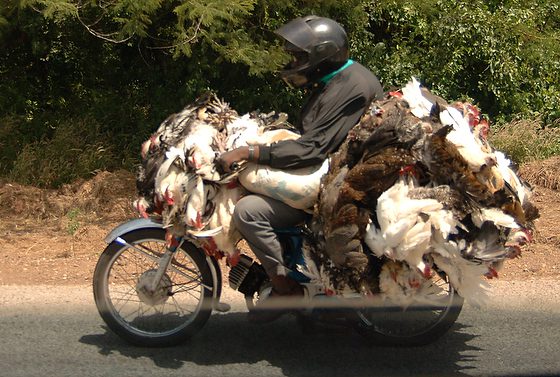| Nikon D2X, Sigma 18-50mm f/2.8 EX DC, ISO 400, ƒ/2.8, 1/5000 |
This “Chicken Man” was on the road between Tenkodogo and Ouagadougou in Burkina Faso, West Africa. These are “free range” chickens that tie their feet together to take them to market.
Instead of ordering “free range” chickens off the menu, they are called “bicycle chicken.” Of course, they get that name, as you can see in how they bring them to market.
We hear today the benefits of eating natural organic food. We think of organic as a natural process.
 |
| Nikon D2X, Sigma 18-50mm f/2.8 EX DC, ISO 400, ƒ/2.8, 1/400 |
Mergers and acquisitions, which are inorganic growth, are an aggressive approach to growing a business. While most photographers are too small to think of merging or acquisitions, the aggressive approach to business is hurting their growth.
When you start a small business, you must focus on growing your customer base, reinvesting profits in new assets for more significant income, and improving productivity to increase your bottom line. All of these efforts are examples of organic growth. In a nutshell, organic growth is focused on preplanning and preparing for the future.
 |
| Nikon D4, 14-24mm f/2.8G ED, ISO 125, ƒ/14, 1/250 |
Photographers need to operate their business like a farmer. He prepares the ground, plants the seeds, weeds the fields, waters the crop, and does what they can to protect the crop when storms come. The percentage of the farmer’s time is in the preparation versus the harvest.
Advice for the photographer
- Dream first of what you hope for
- Think of all the steps necessary for you to reach that dream
- Invest your time and energy in getting the things you need to make the dream a reality
- Create your action plan
- Execute the plan
There are a couple of significant insights for the photographer from the farmer. First, there is a season for planting and a season for harvesting. The farmer clears the fields when they first start. They may have to clear trees and brush and remove rocks and stones from their areas before plowing the fields to prepare the ground for the seeds.
In West Africa, farmers are so poor they cannot buy fertilizer. It costs more than they will get out of the harvest. Many of these farmers will plant two seeds in the field because if they get enough rain, one of the plants will thrive, but if it is a dry season, the other plant will do better.
 |
| Nikon D2X, Sigma 18-50mm f/2.8 EX DC, ISO 100, ƒ/5, 1/500 |
This farmer here works the fields in Koudougou, Burkina Faso. He is part of the bible school where they not only teach theology but farming to help the pastors feed their families while they minister as bi-vocational pastors.
Photographers may need to be bi-vocational as well today.
Overnight Success
You will look like an overnight success only if you are ready. There are some things in your dream that you will try and force to happen. We all do this, and then we slowly learn that sometimes the problem was we have been planting seeds in the fall and not the spring, or we were trying to harvest in the spring rather than the fall.
Here are a few things to help you become that overnight success.
- Have an elevator speech ready [earlier blog on elevator speech]
- Have ideas prepared for clients – Don’t just show your portfolio, do some research and have some pictures you can pitch to them when that opportunity presents itself.
- Prepared replies – Think about those situations that a client may ask you to do something and how you should respond. The more you anticipate issues, the better you will come off when they arise.

